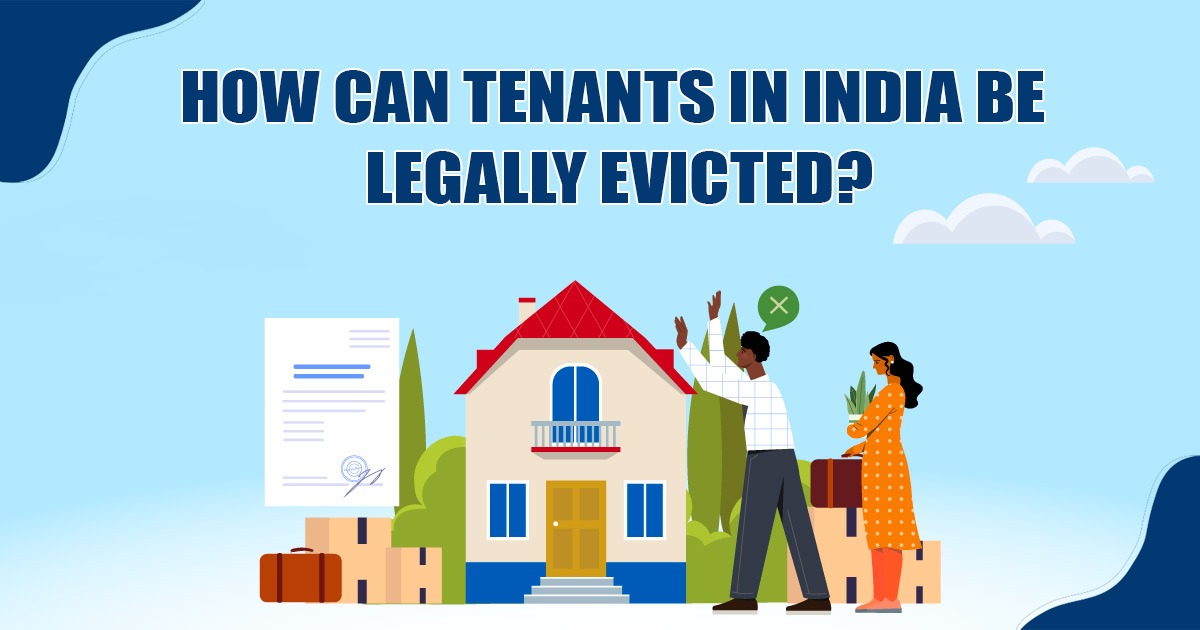How can tenants in India be legally evicted?
By Bricksnwall | 2024-05-19

Evicting a tenant can be extremely stressful for a
landlord, especially if the renter is not paying rent or is not leaving the
property. However, multiple state laws in India govern landlord-tenant
evictions. So, let's look at how a landlord can legally evict a tenant based on
a justifiable and valid reason.
Finding a tenant is simple and one of the most
convenient ways to make money; but, renting out one's property to a stranger
carries a significant risk. Especially when you need to evict a renter who is
not paying their rent or vacates the property. Nowadays, landlords take extreme
pains to avoid such situations and are well-versed in the rules and regulations
governing rental laws, and landlord and tenant rights in India, as outlined in
the Rent Control Act, which was passed by the Government of India in 1948. The
State Governments implemented this Act to manage property rentals and tenant
evictions. Under this Act, the landlord and tenant must execute a Rent
Agreement that specifies the rented property, the rent period, the monthly rent
amount, and the parties involved.
Table of Contents: Grounds for Evicting a Tenant in India.
- How
do you evict a tenant in India?
- How
to avoid illegal evictions in India?
- What
are the actions to follow if the renter fails to pay the rent?
Grounds for evicting a tenant in India
Rental laws in India allow landlords to initiate an eviction suit against a tenant if there is justified and valid grounds for doing so. The following are the grounds for evicting a renter in India.
- The
tenant has purposefully failed to pay a mutually agreed-upon rent sum for
more than 15 days from the due date.
- The
tenant sublets a rented property to another person without first obtaining
the landlord's approval or submitting a written request.
- The
renter has utilized the rented premises illegally or for reasons other
than those specified in the rental agreement.
- Any
activity by the renter has resulted in a loss of property value or
utility.
- The
neighborhood finds the tenant's actions distasteful, and the landlord has
received a complaint about them.
- For
unclear reasons, the renter purposely denied the landlord's title to the
rented home.
- The
landlord requires their property for their personal use or for any family
members.
- The
landlord needs their property for repairs and renovations, which are not
possible unless the property is vacant.
- Stage
II - File an Eviction Suit: After obtaining the court's eviction notice,
the tenant might refuse to depart the rented property and challenge the
eviction.
In this instance, the landlord may hire a rental property attorney to bring an eviction action against the renter. The tenant's eviction lawsuit is filed in the civil court that has jurisdiction over the rented property.
How to avoid illegal evictions in India?
The Supreme Court of India has ruled that landlords
cannot evict a tenant for at least 5 years provided the rent is paid on time,
unless the landlord truly needs the property for himself or herself. Other
factors to avoid while evicting a tenant include:
- The
rent agreement must be established with the assistance of a property
lawyer and must include clauses pertaining to the use of property,
termination of the rent agreement, rent amount, etc.
- Rent
agreements must be for a maximum of 11 months and include an option for
renewal. It protects against potential eviction issues.
- The
grounds for eviction must be justifiable under the state's rental
regulations in where the property is located.
- The landlord must not adopt illegal eviction
methods such as cutting off basic utilities such as electricity or water,
altering the locking mechanism of the tenanted property, removing the
tenant's goods from the rented property, or imposing his own penalties.
These are criminal violations, and if the renter is found guilty of such
behavior, he or she may press charges against the landlord.
- The
landlord must not evict a tenant without first serving an eviction notice.
- A background check must be completed before renting the home to someone.
What are the actions to follow if the renter fails
to pay the rent?
The lease agreement should ideally contain courses
of action in the event of nonpayment of rent. Nonetheless, nonpayment of rent
is one of the most common reasons for eviction under state tenancy acts. A
legal notice could be given to the renter in question, outlining the rent due,
requesting the tenant to comply or vacate, and the course of action you intend
to take if the tenant does not answer in either case.




